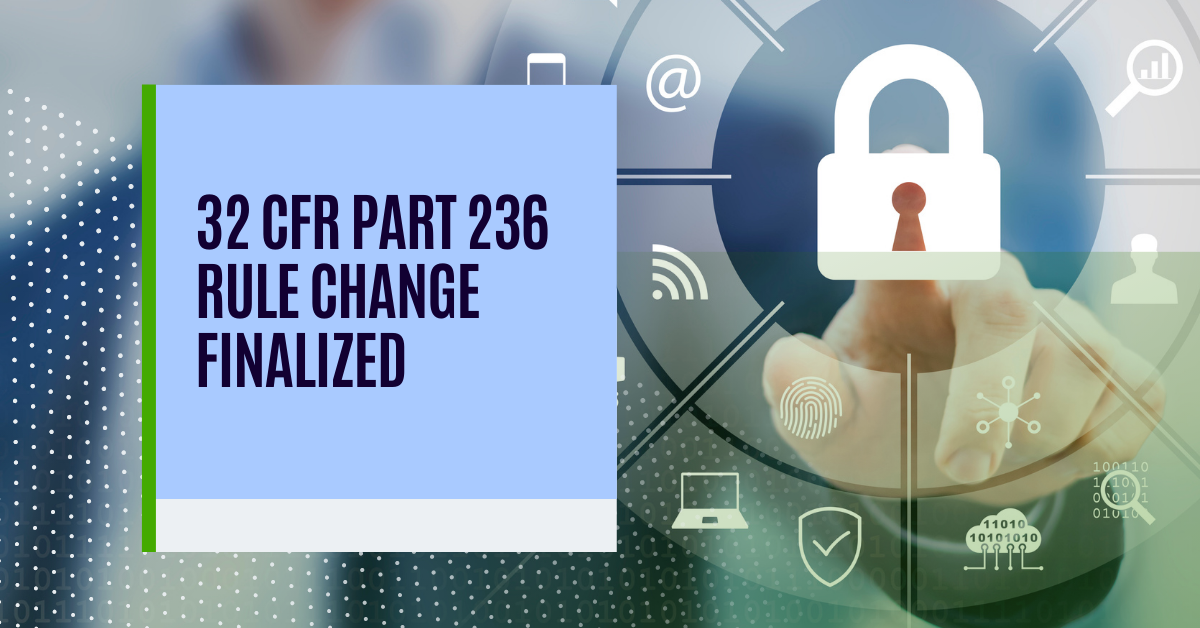
32 CFR Part 236 Rule Change Finalized
The rule change to 32 CFR Part 236 primarily modifies the Defense Industrial Base (DIB) Cybersecurity (CS) Program to expand eligibility and streamline cyber incident reporting requirements among defense contractors. Here's a comprehensive summary of the significant changes and their implications:
Changes to Eligibility and Reporting Requirements
- Expanded Eligibility: The Department of Defense (DoD) has revised the eligibility criteria to include not just cleared defense contractors but any contractor that owns or operates a covered contractor information system. This change removes the previous requirement for contractors to have a facility clearance at the Secret level or higher. By broadening the eligibility, an additional 68,000 defense contractors are estimated to become eligible for the program, thus enhancing the defense supply chain's resilience against cyber threats.
- Streamlined Reporting Procedures: In response to feedback about the burdensome cost of medium assurance certificates, the DoD is shifting from requiring these certificates to requiring contractors to register for a Procurement Integrated Enterprise Environment (PIEE) account. This adjustment aims to unify identity proofing processes across the majority of DIB companies and reduce costs for contractors.
Implications of the Changes
- Cost Reduction: Eliminating the need for medium assurance certificates for cyber incident reporting reduces financial burdens on contractors, making compliance more accessible and streamlined.
- Increased Security Posture: By allowing a broader range of contractors to participate, the DIB CS Program can cover more of the defense supply chain, potentially decreasing the likelihood of cyber breaches that could impact national security.
- Operational Adjustments: The rule updates also refine operational definitions and requirements, such as removing specific limits on the number of company-designated points of contact (POCs), which could previously cause confusion and restrict larger companies.
Financial and Operational Impact
- Economic Analysis: The change is expected to incur various costs, including familiarization with the new rules and ongoing participation expenses for both contractors and the DoD. Contractors will save on the cost of medium assurance certificates but will need to invest time and resources into understanding and integrating the new PIEE requirements.
- Government Costs: The DoD will continue to bear costs associated with administering the program, including processing applications and managing cybersecurity threats. These costs are justified by the significant benefits of increased cyber defense capabilities across the defense contractor base.
Broader Benefits
- Enhanced Cyber Defense: The adjustments are part of the DoD's broader strategy to strengthen cybersecurity defenses within the DIB. By facilitating easier participation and reporting, the DoD aims to gather more comprehensive threat data, improving overall national defense cyber readiness.
- Strategic Outreach and Growth: The program's expansion is expected to be promoted through various channels, including conferences and digital media, to ensure that the defense contractor community is aware of and prepared to comply with the new requirements.
In summary, the amendments to 32 CFR Part 236 are designed to modernize and expand the DIB CS Program, making it more inclusive and financially accessible for defense contractors, which in turn enhances the collective cybersecurity posture of the national defense supply chain. These changes reflect the DoD's commitment to adapting its strategies in response to evolving cyber threats and industry feedback.